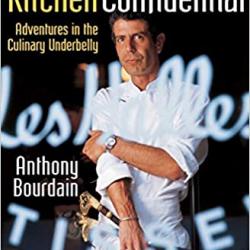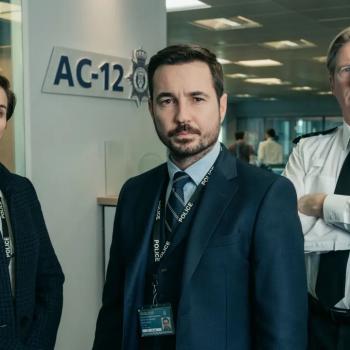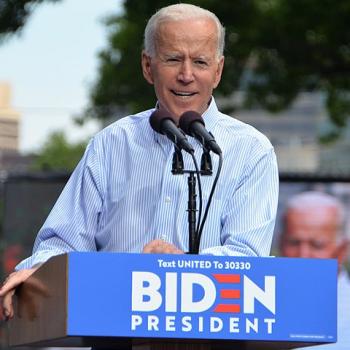![By Peabody Awards (Anthony Bourdain and Charlie Rose) [CC BY 2.0 (https://creativecommons.org/licenses/by/2.0)], via Wikimedia Commons](https://upload.wikimedia.org/wikipedia/commons/thumb/1/13/Anthony_Bourdain_2014_%28cropped%29.jpg/222px-Anthony_Bourdain_2014_%28cropped%29.jpg)
In Las Vegas, as long as you’re gambling, the drinks are free. In Granada, Spain, as long as you’re drinking, the tapas are free. Yes, you could say both the casino and the bar are trying to take your money, but at least the tapas bar wants to feed you, both body and soul.
Anthony Bourdain, who traveled the world – Grenada and beyond – to show us all how food and drink feed both body and soul, in his TV series and his books, was found dead in his hotel room Friday morning, June 8, having taken his own life. God rest his soul.
I’d like to say that everyone mourned Mr. Bourdain. But some didn’t. Because when a celebrity commits suicide, you can count on conservative Catholic writers to give us the disgusting spectacle of sneering at a celebrity who takes his or her own life.
Last week we had two celebrity suicides. But the June 5 suicide of fashion designer Kate Spade, who hanged herself in her Manhattan apartment, was largely overlooked by the right wing Catholic crowd. May she rest in peace too.
But when Mr. Bourdain’s death hit the news, they swooped in.
“If Anthony Bourdain had been a religious man, would he have killed himself? Probably not,” Catholic League president Bill Donohue wrote on his webpage before Mr. Bourdain’s body was even cold. Of course, Mr. Donohue may have just used it as an opportunity to plug his new book, the title of which makes Mr. Donohue seem like Joel Osteen for Catholics:
As I have recounted in my book, The Catholic Advantage: How Health, Happiness, and Heaven Await the Faithful, there is an inverse relationship between religiosity and suicide: those who are regular churchgoers have a much lower rate of suicide than atheists like Bourdain.
Thanks for sharing, Bill. And thanks for reducing Mr. Bourdain, beloved by millions, to nothing but “an atheist.”
Mr. Donohue comes off as restrained when compared with blogger Matt Walsh who, also publishing Friday, wrote:
I think that problem is emptiness. There is an emptiness at the core of our culture, and from this root the suicide epidemic grows. We have fled from God, from meaning, from purpose, and embraced a soft kind of nihilism; a nihilism that will not call itself nihilism.
Ohhh-kaaay….
Mr. Walsh was just warming up: “If you do what everyone else is doing, and live how they live, and walk in their footsteps, you will end up in the same darkness. You will begin to feel that there is no hope and no point and no real beauty or joy to be found in life.”
This is nothing new for Mr. Walsh, who, writing about Robin Williams’ suicide in 2014, said, “It’s a tragic choice, truly, but it is a choice, and we have to remember that.” Did Mr. Walsh issue a correction or apology when the autopsy revealed that, actually, Robin Williams really had no choice? No, of course not. But never mind.
Food and Love
Enough of those two ingrates. Let’s talk about Anthony Bourdain. Why did people love him so? Because he traveled far, but never forget where he came from? Because he was just as comfortable in someone’s kitchen with a four-burner electric range as he was in a gourmet restaurant? Maybe even more-so the former?
The first time I ever saw him on TV, he attended a baseball game in Japan, enjoying beer and sushi. Then he went to Beijing, where he gorged on noodles and ate goose in a back-alley restaurant that steamed the birds over an open fire. And he enjoyed himself capitally.
He knew how to immerse himself in a culture without appropriating it. And though he denied being a journalist, that’s exactly what he was. He was a natural at it: rubbing elbows with the great and small from Tehran to Texas, from Seattle to Sicily, telling the stories of the people he met, their food, their hopes and dreams, and sometimes their fears. For the series premier of Parts Unknown, he was one of the first Western journalists to visit Myanmar following the relaxing of government control in 2013.
While filming an episode of No Reservations in 2005, the Israel-Lebanon conflict broke out and he had to be evacuated by the U.S. Marine Corps. The episode was nominated for an Emmy award in 2007.
Anthony Bourdain never sneered. He comported himself with a profound sense of gratitude. He was a foodie, but he showed us that “foodie” does not mean “food snob.” For a Parts Unknown episode in Charleston, South Carolina, he enjoyed a late-night meal at a Waffle House. The next day, he dined on classic Southern fare in a gourmet Charleston restaurant (with actor Bill Murray). Later, he delved into traditional Gullah cuisine and history.
The common thread that runs through all of Mr. Bourdain’s work – something that the Bill Donohues and Matt Walshes of the world will never understand – is love: love of craft. Love of tradition. Love of good food and good friends and good drink. Love of beauty. Love.
What G.K. Chesterton once wrote of St. Francis, that he “did not love humanity, but men,” also applies to Mr. Bourdain. He did not love cuisine, but food. And he did not love humanity, but the ordinary men and women he met in all corners of the earth, eating and loving and laughing with them. Whatever drove him to take his own life, I like to think that, between his capacity for love and God’s infinite mercy, Anthony Bourdain may have a seat at the heavenly banquet.











